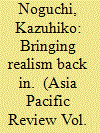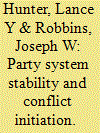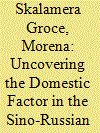| Srl | Item |
| 1 |
ID:
110899


|
|
|
|
|
| Publication |
2011.
|
| Summary/Abstract |
This article argues that offensive realism is applicable to explain China's strategic behavior. Contrary to constructivist and liberal arguments, ideational and domestic factors are not the primary causes of China's strategic behavior. Instead, structural and material factors such as anarchy and the distribution of relative power significantly shape how China behaves in the Asia-Pacific. Furthermore, they have a larger impact relative to non-material/unit-level variables on China's policymaking. Available evidence strongly indicates that China's strategic behavior is driven by power maximizing calculation. China's grand strategy, its maritime ambition as well as naval modernization, and rapid growth rate of military expenditure all confirm the hypotheses of offensive realism.
|
|
|
|
|
|
|
|
|
|
|
|
|
|
|
|
| 2 |
ID:
111292


|
|
|
| 3 |
ID:
153881


|
|
|
|
|
| Summary/Abstract |
The study of interstate conflict has yielded a voluminous literature to date, yet much of the recent work has only just begun to underscore the importance of domestic factors in predicting conflict initiation in democracies. In short, some of these studies find that when electoral accountability is greater—measured in a variety of ways—interstate conflict becomes less likely. Despite this burgeoning literature, scholars have spent far less time analysing the role linkage institutions, such as stable party systems, have played in foreign policy discussions. To address this gap, we argue that in more stable party systems conflict initiation becomes less likely due to the greater accountability present in these systems. This conjecture is supported by the results of a time-series cross-sectional analysis of 48 democracies from 1978 to 2000 that uses multiple measures of conflict initiation and party system stability.
|
|
|
|
|
|
|
|
|
|
|
|
|
|
|
|
| 4 |
ID:
172814


|
|
|
|
|
| Summary/Abstract |
What explains the differences in the Sino-Russian oil and gas cooperation? Overall, I suggest, the several trajectories are explained by the dissimilarities of oil and gas as commodities and potential foreign policy tools. These differences, along with other factors, such as corporate culture and individual personalities, shed light on the strategies of Russia’s gas conglomerates, Gazprom and Rosneft. Yet, if a more nuanced understanding of variation within these energy markets illuminates the reasons behind the sequencing of oil and gas cross-border pipeline projects, what explains the particular timing of the landmark 2014 gas deal? Why after 15 years of stalemate in the Sino-Russian gas cooperation did breakthroughs occur in 2014? And what explains the modesty of the record in gas cooperation to date? Many factors are undoubtedly involved, both economic and political; however, I contend that the conclusive factor can be found in underlying domestic politics.
The article outlines the role of national narratives in driving both Russia and China’s energy foreign policy and goes on to argue that the Sino-Russian gas breakthrough in 2014 was due to the peculiar way in which domestic factors paired with international circumstances to produce the outcome at that particular moment.
|
|
|
|
|
|
|
|
|
|
|
|
|
|
|
|